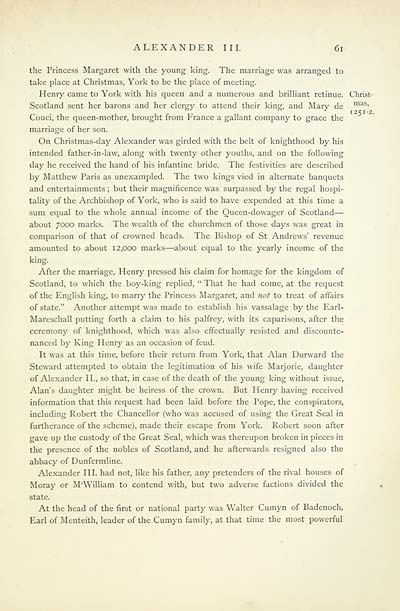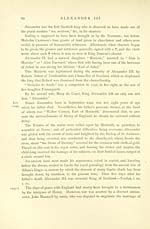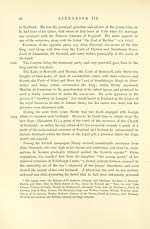Family records of the Bruces and the Cumyns
(73) Page 61
Download files
Complete book:
Individual page:
Thumbnail gallery: Grid view | List view

ALEXANDER III. 61
the Princess Margaret with the young king. The marriage was arranged to
take place at Christmas, York to be the place of meeting.
Henry came to York with his queen and a numerous and brilliant retinue. Christ-
Scotland sent her barons and her clergy to attend their king, and Mary de mas '
Couci, the queen-mother, brought from France a gallant company to grace the
marriage of her son.
On Christmas-day Alexander was girded with the belt of knighthood by his
intended father-in-law, along with twenty other youths, and on the following
day he received the hand of his infantine bride. The festivities are described
by Matthew Paris as unexampled. The two kings vied in alternate banquets
and entertainments ; but their magnificence was surpassed by the regal hospi-
tality of the Archbishop of York, who is said to have expended at this time a
sum equal to the whole annual income of the Queen-dowager of Scotland —
about 7000 marks. The wealth of the churchmen of those days was great in
comparison of that of crowned heads. The Bishop of St Andrews' revenue
amounted to about 12,000 marks — about equal to the yearly income of the
king.
After the marriage, Henry pressed his claim for homage for the kingdom of
Scotland, to which the boy-king replied, " That he had come, at the request
of the English king, to marry the Princess Margaret, and not to treat of affairs
of state." Another attempt was made to establish his vassalage by the Earl-
Mareschall putting forth a claim to his palfrey, with its caparisons, after the
ceremony of knighthood, which was also effectually resisted and discounte-
nanced by King Henry as an occasion of feud.
It was at this time, before their return from York, that Alan Durward the
Steward attempted to obtain the legitimation of his wife Marjorie, daughter
of Alexander II., so that, in case of the death of the young king without issue,
Alan's daughter might be heiress of the crown. But Henry having received
information that this request had been laid before the Pope, the conspirators,
including Robert the Chancellor (who was accused of using the Great Seal in
furtherance of the scheme), made their escape from York. Robert soon after
gave up the custody of the Great Seal, which was thereupon broken in pieces in
the presence of the nobles of Scotland, and he afterwards resigned also the
abbacy of Dunfermline.
Alexander III. had not, like his father, any pretenders of the rival houses of
Moray or M'William to contend with, but two adverse factions divided the
state.
At the head of the first or national party was Walter Cumyn of Badenoch,
Earl of Menteith, leader of the Cumyn family, at that time the most powerful
the Princess Margaret with the young king. The marriage was arranged to
take place at Christmas, York to be the place of meeting.
Henry came to York with his queen and a numerous and brilliant retinue. Christ-
Scotland sent her barons and her clergy to attend their king, and Mary de mas '
Couci, the queen-mother, brought from France a gallant company to grace the
marriage of her son.
On Christmas-day Alexander was girded with the belt of knighthood by his
intended father-in-law, along with twenty other youths, and on the following
day he received the hand of his infantine bride. The festivities are described
by Matthew Paris as unexampled. The two kings vied in alternate banquets
and entertainments ; but their magnificence was surpassed by the regal hospi-
tality of the Archbishop of York, who is said to have expended at this time a
sum equal to the whole annual income of the Queen-dowager of Scotland —
about 7000 marks. The wealth of the churchmen of those days was great in
comparison of that of crowned heads. The Bishop of St Andrews' revenue
amounted to about 12,000 marks — about equal to the yearly income of the
king.
After the marriage, Henry pressed his claim for homage for the kingdom of
Scotland, to which the boy-king replied, " That he had come, at the request
of the English king, to marry the Princess Margaret, and not to treat of affairs
of state." Another attempt was made to establish his vassalage by the Earl-
Mareschall putting forth a claim to his palfrey, with its caparisons, after the
ceremony of knighthood, which was also effectually resisted and discounte-
nanced by King Henry as an occasion of feud.
It was at this time, before their return from York, that Alan Durward the
Steward attempted to obtain the legitimation of his wife Marjorie, daughter
of Alexander II., so that, in case of the death of the young king without issue,
Alan's daughter might be heiress of the crown. But Henry having received
information that this request had been laid before the Pope, the conspirators,
including Robert the Chancellor (who was accused of using the Great Seal in
furtherance of the scheme), made their escape from York. Robert soon after
gave up the custody of the Great Seal, which was thereupon broken in pieces in
the presence of the nobles of Scotland, and he afterwards resigned also the
abbacy of Dunfermline.
Alexander III. had not, like his father, any pretenders of the rival houses of
Moray or M'William to contend with, but two adverse factions divided the
state.
At the head of the first or national party was Walter Cumyn of Badenoch,
Earl of Menteith, leader of the Cumyn family, at that time the most powerful
Set display mode to:
![]() Universal Viewer |
Universal Viewer | ![]() Mirador |
Large image | Transcription
Mirador |
Large image | Transcription
Images and transcriptions on this page, including medium image downloads, may be used under the Creative Commons Attribution 4.0 International Licence unless otherwise stated. ![]()
| Histories of Scottish families > Family records of the Bruces and the Cumyns > (73) Page 61 |
|---|
| Permanent URL | https://digital.nls.uk/95071862 |
|---|
| Description | A selection of almost 400 printed items relating to the history of Scottish families, mostly dating from the 19th and early 20th centuries. Includes memoirs, genealogies and clan histories, with a few produced by emigrant families. The earliest family history goes back to AD 916. |
|---|

